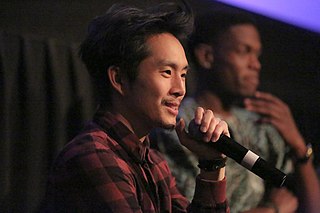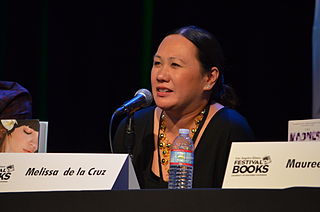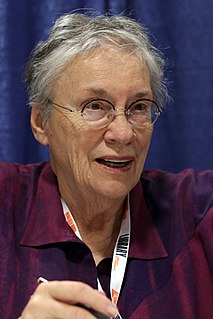A Quote by Toni Morrison
All she saw, down in the cellar well beneath the stoop, was a light yellow feather with a tip of green. And she had never named him. Had called him "my parrot" all these years. "My parrot." "Love you. "Love you." Did the dogs get him? Or did he get the message - that she said, "My parrot" and he said, "Love you," and she had never said it back or even taken the trouble to name him - and manage somehow to fly away on wings that had not soared for six years.
Related Quotes
She had been ready to love this man from the moment she first saw him. In all these years, that had never changed. They'd hurt each other, let each other down, and yet, here they were after everything, together. She needed him now, needed him to remind her that she was live, that she wasn't alone, that she hadn't lost everything.
She'd always known he loved her, it had been the one certainty above all others that had never changed, but she had never said the words aloud and she had never meant them quite this way before. She had said it to him, and she hardly knew what she had meant. They were terrifying words, words to encompass a world.
Her first reaction was one of hope, because his eyes were open and shining with a radiant light she had never seen there before. She prayed to God to give him at least a moment so that he would not go without knowing how much she had love him despite all their doubts, and she felt an irresistible longing to begin life with him over again so that they could say what they had left unsaid and do everything right that they had done badly in the past. But she had to give in to the intransigence of death. (Love in the Time of Cholera)
The tent in which she first met him had smelled of blood, of the death she did not understand, and still she had thought of it all as a game. She had promised him the world. His flesh in the flesh of his enemies. And much too late had she realized what he had sown in her. Love. Worst of all poisons.
She looked at him then, but his image blurred behind tears that swelled into her eyes. She must leave. She must leave this room, because she wanted to hit him, as she had sworn she never would do. She wanted to cause him pain for taking a place in her heart that she wouldn't have given him if she'd known the truth. "You lied to me," she said. She turned and ran from the room.
And he absolutely had to find her at once to tell her that he adored her, but the large audience before him separated him from the door, and the notes reaching him through a succession of hands said that she was not available; that she was inaugurating a fire; that she had married an american businessman; that she had become a character in a novel; that she was dead.
He put the box in Kahlan's lap. As she picked it up, she gave him the biggest smile he had ever seen. Before he even knew what he had done, he had leaned over and given Kahlan a quick kiss. Her eyes went wide, and she didn't kiss him back, but the feel of her lips shocked him into realizing what he had done. Oh. Sorry," he said. She laughed. "Forgiven.
I didn't have a chance to buy you anything," she said, then held both closed hands toward him. Uncurled her fingers. In each cupped palm a brown egg. He took them. They were cold. He thought it a tender, wonderful thing to do. She had given him something, the eggs, after all, only a symbol, but they had come from her hands as a gift. To him. It didn't matter that he'd bought them himself at the supermarket the day before. He imagined she understood him, that she had to love him to know that it was the outstreched hands, the giving, that mattered.
Really love him, I mean," Geilie persisted. "Not just to bed him; I know you want that, and he does too. They all do. But do you love him?" Did I love him? Beyond the urges of the flesh? The hole had the dark anonymity of the confessional, and a soul on the verge of death had no time for lies. "Yes," I said, and laid my head back on my knees. It was silent in the hole for some time, and I hovered once more on the verge of sleep, when I heard her speak once more, as though to herself. "So it's possible," she said thoughtfully.





































